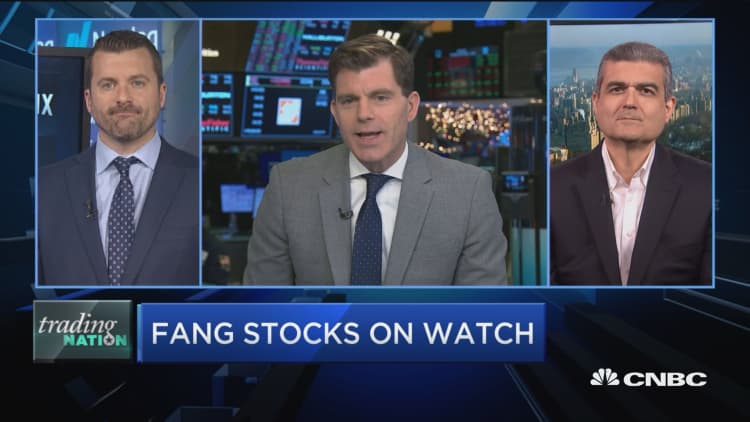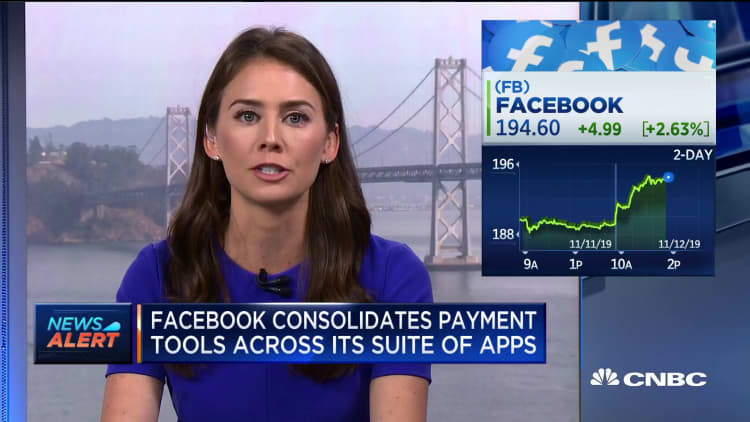Facebook has a $52 billion problem: It's got more cash than all but a handful of American companies, but so much of Washington is mad at the social media leader that the heat may be too much for the company to make the big acquisitions the market normally would expect.
For finance types like Facebook CFO David Wehner, not to mention his boss, Facebook Chief Executive Mark Zuckerberg, all that cash on the balance sheet creates a fascinating problem.
Facebook pays no dividend, but even adding a 2% dividend yield to its high-flying shares would consume only about $11 billion a year, at a company that generated $32 billion in operating cash flow over the last 12 months. Meanwhile, Facebook actually has slowed down the pace of its stock buybacks this year, after spending more than $11 billion on buybacks during 2018, when shares slumped to as low as $124. Currently, shares are trading near-$200.
Growth in capital spending is expected to level off next year, RBC Capital Markets analyst Mark Mahaney wrote after the company's third-quarter earnings report.

So what's left?
"There's a real political constraint to their ability to do stuff," said Samantha McLemore, a portfolio manager at Miller Value Partners in Baltimore, which owns 387,000 shares of Facebook and was founded by famed value investor Bill Miller. "Big tech companies have let their cash piles grow and grow and grow," McLemore said.
Facebook's press office did not respond to multiple requests for an interview.
Facebook's political problems drive down the odds that it will use any major chunk of its cash for acquisitions, said CFRA Research analyst John Freeman, even though CNBC recently reported that Facebook did bid on FitBit before Alphabet acquired it.
Senators Bernie Sanders and Elizabeth Warren have both made criticism of Facebook's past acquisitions of Instagram and WhatsApp a staple of their argument that the Trump and Obama administrations have allowed Big Tech companies grow too powerful amid lax antitrust enforcement. They have vowed to try to break up Facebook and Alphabet, the parent company of Google, as they exist now.
"They're in a box," Freeman said. "They're in the M&A box."
A wild idea: Taking Facebook private
Perhaps no analyst is as willing to be provocative in discussing Facebook's cash issues as Freeman, who rates the company's stock a buy. And his craziest idea of all, as he acknowledges himself, is that Zuckerberg, tired of the fuss that attends running a public company and owning a large stake already, simply could take Facebook private.
"It would be the biggest deal ever, but why not go private?" Freeman said.
Indeed, it would. The biggest going-private transaction ever is Dell's $67 billion deal to acquire and take computer-storage giant EMC private in 2016, according to a 2018 list compiled by PitchBook. Big buyouts like Kraft Heinz (a $26 billion deal that combined the previously private Heinz with Kraft as a public company), Dell's own $25 billion leveraged buyout in 2013 and a raft of pre-financial crisis deals for Equity Office Properties Trust, Hilton Worldwide and Caesar's Entertainment, trail far behind Facebook's $565 billion market cap.
Even with Facebook's prodigious profitability, the numbers would be at least a little daunting. Earnings before interest, taxes, depreciation and amortization for 2018, a key measure of a company's ability to support buyout debt, were $29.2 billion, up 25% from 2017. But Mahaney projects that number to grow to $40 billion this year and a whopping $60 billion by 2021.

In theory the 2021 number is enough to service debt from such a deal, not least because Zuckerberg and other insiders wouldn't have to buy in their own shares, reducing the cost of the deal to about $400 billion at today's share price. With high-quality corporate bonds paying only 3% to 4% interest these days, interest payments on a Facebook deal might be about $16 billion, or $20 billion if the buyers paid a modest premium for shares, assuming insiders all kept their existing share holdings.
But it would still be well above the level of debt the bond market usually likes to let buyout companies carry, McLemore said. A common rule of thumb is that companies should limit post-buyout debt to four times their annual EBITDA, which in Facebook's case suggests that it could carry about $300 billion in debt by 2021, using the company's existing cash to reduce the buyout group's borrowing.
That would still leave a buyout group short of enough to buy the company, in her estimation. The question is how investors would react to a buyout by a company still growing as fast as Facebook is.
"The size and the politics are barriers," she said. "It's a very high-quality company. There would be a lot of demand (to buy the debt). The question is, how much?"
Giving money back to shareholders
McLemore, whose boss Bill Miller compiled an unprecedented track record of beating the broader stock market for 15 consecutive years by applying value-investing principles to growth companies like Dell and Amazon, argues that a more balanced, straightforward approach to capital management is the right path for Facebook now.
One key would be for the social network to overcome Big Tech's traditional antipathy to paying dividends, as more mature leaders like Microsoft, Intel, and, in 2012, Apple did after a long hiatus from offering one. The S&P 500 since 1990 has gotten about a quarter of its annual returns from income, as opposed to capital appreciation. Numbers like those make a dividend worthwhile, McLemore said. At the same time, Facebook's stock looks undervalued to Miller Value, she said, making it an even better short-term option to ramp up buybacks again. Especially if, or when, political tides push the shares temporarily lower.
"Apple did a balanced approach with both, and that makes a lot of sense," she said.
Apple's example is instructive: Since it reimplemented its cash dividend, aggressive share buybacks and the cash dividend yield of 1.2% have helped drive shares to $262 from $86, though its annual revenue has grown about 3% and net income less than 1% annually, smoothing out volatile swings caused partly by China's 2015-16 economic hiccup, McLemore said.
Leaving too much cash on the balance sheet, earning low-single digit returns, is a value-destroyer for undervalued companies in general, especially when they are growing as rapidly as Facebook, McLemore said. Facebook can easily reduce its share count and build earnings per share, and share price through buybacks, she said. Meanwhile, a dividend can attract a whole class of investors and funds who demand that their holdings generate income.
"We'd leave it to the company, but doing something makes a lot of sense," she said.
$17 billion in free cash flow
Facebook's existing business is also replete with areas that it could invest in, but investment is already fairly heavy, Mahaney said. Indeed, he projects that this year will mark the peak in Facebook's recent growth rate for investing back into its businesses. Even with rising investment, the company has generated about $17 billion in free cash flow over the last four quarters.
In a new buy rating on Facebook shares from Piper Jaffray this week, the brokerage firm noted that growth of Facebook's investment in infrastructure of various types spiked to as high as 140% year over year in the middle of 2018, but capex grew only 5% to 6% year over year in Q2 and Q3 of 2019. That declining trend in spending will add to free cash flow generation in the coming years.
Some of the businesses Facebook could develop, on its own or with small acquisitions, include video, payments and even cloud computing, CFRA's Freeman said.
The company recently launched its Facebook Pay service, a kind of e-wallet that makes it simpler to make purchases without leaving Instagram or Facebook for an e-commerce site. Mahaney also thinks the company will try to sell more advertising through the WhatsApp and Facebook messaging services. Mahaney estimates that Facebook Messenger alone could generate $6 billion or more in annual ad revenue, though he didn't set a timeline.
"They want to turn Instagram into insta-shopping," Mahaney said. "And they want to make their four main services more interoperable.''

But Mahaney, the veteran top-rated analyst on the internet industry, is skeptical of some of the expansion opportunities. He said Facebook has made clear that it doesn't want to start a spending spree for original video content, for example, as Apple and Amazon are both now doing. He doesn't think Facebook is likely to launch a cloud computing business, either.
Amazon leads the cloud services race (with as much as a 40% share of the market), while Microsoft and Alphabet have been growing their share, in second and third place, respectively.
Zuckerberg recently complained about the prices charged by Amazon Web Services, but when he was asked about the opportunity to leverage its existing data centers on Facebook's Q2 2018 earnings call, the CEO indicated that offering cloud services to third parties was not a business he thought made sense for the company to enter: "We're not planning on going into the cloud services — we're not planning on doing that," he said.
"They all would require major capital outlays," Mahaney said of new businesses, from streaming video to the cloud. "I think all of these are very unlikely.''
The safest bet is that Facebook will turn, sometime over the next couple of years, to a larger-scale return of capital to shareholders as its cash position turns truly giant, Mahaney said. By 2021 the company could be approaching an Apple-like $100 billion in cash, and unlike Apple, Facebook has no long-term debt. "In a year or two they truly will have excess cash."
That kind of cash stash would be enough to let Zuckerberg, Wehner and the rest of the top Facebook executives buy in as much as 20% of Facebook stock held by the public, and still have plenty left over, with tens of billions more streaming into its coffers each year even after investing a projected $17 billion to $19 billion in capital projects next year.
And that would leave plenty of cash to help Facebook get over traditional reticence about Web companies paying dividends.
"I wouldn't be surprised to see them pay a dividend in the next three to five years," Mahaney said.
But don't count on it soon. In Facebook's last two earnings calls, the company mentioned share buybacks only in passing, and no one on Wall Street asked about a dividend even once.






